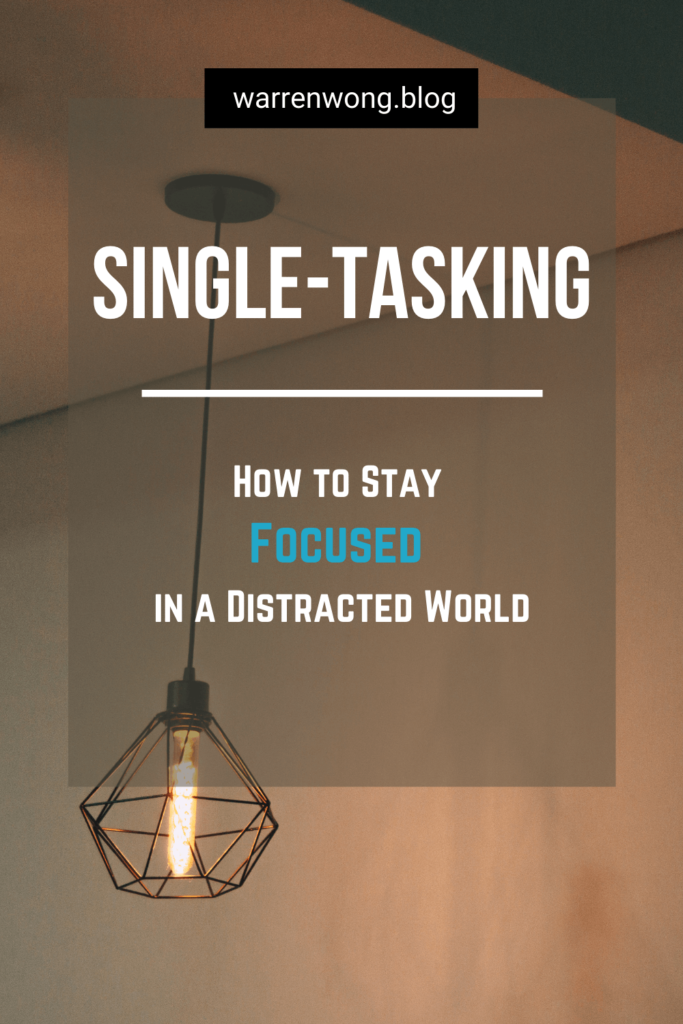Single-Tasking: How to Stay Focused in a Distracted World
4 minute read · By Warren Wong
Less is more. In a world of social media frenzy, swipes, likes, followers, and notifications chimes, it’s not too hard to see why we don’t get much done these days, at least what’s truly important. Cue the music, here comes single-tasking, which you can think of as the opposite of multitasking.
If you’re wondering how to stay focused in a distracted world, then you are not alone. Let’s dive in.

If you had to cut a tree wouldn’t you want to focus your swings at one spot?
What is Single-Tasking
Single-tasking is the act of working on one thing at a time, without switching through different browsers and perusing the latest memes on Twitter. It’s being able to sit down with a book – yes one of those crusty things – and read it without checking your phone every 10 minutes.
On the road to glorifying productivity, through the Get It Done, Pomodoro, and the 2 Minute Rule, we have forgotten how to effectively get things done. Doing more does not mean that it’s better, and doing less does not mean you are lazy.
Related post: 3 Productivity Hacks From Elite Performers
The Myth of Multitasking

It’s not difficult to do a quick google search on “the myth of multitasking” to find thousands of results. Raise your hand if you heard someone say that they are a great multitasker, or even brag about it in a job interview. Maybe that person was even you.
First and foremost, what is multitasking? Well, generally it’s described as being able to perform multiple tasks at the same time. Wait a minute. Is that even possible?
Quick, take your right hand and rub your belly in the concentric circle and pat yourself on the head with your left hand. How effective were you?
If you notice you were probably racking your brain trying to remember which hand does what exactly and you probably noticed your movements weren’t exactly smooth.
What ends up happening when multitasking is just the opposite. You’re actually single-tasking, and switching back and forth between the tasks, also known as switch-tasking.
Not only do you expend mental and physical energy switching back and forth, but you get less done.
Related post: How to Be More Efficient: Automate, Delegate, and Batch
Paradox of Choice
Have you ever found yourself flipping through the television stations of the latest Spotify Top Hits trying to find the perfect one? I’ve been there too. This is the paradox of choice.
The paradox of choice is the more options you have, the more difficult it will be to choose. Having many options is great, but sometimes it does not payoff.

The paradox of choice comes in many forms, and it actually makes our lives more difficult, especially with the advent of technology. I’ll be the first to admit that I love technology and the way it’s changed the world, but there are also deep rooted problems that aren’t discussed. For starters, how the heck do you stay focused in such a noisy world?
When I was a kid, I would sit down with a Harry Potter book, and read for hours. I found it very easy to get lost in the subjects of math, reading, and english. There were no distractions. No cellphone (since I didn’t have one until I was a late teenager), terrible dial up internet service, and no TV time until homework was done. Those were the good days. Now, not so much.
Adulthood has proved to be more difficult with so many choices and distractions. No time in history has more information been passed around that it has now.
According to market intelligence company IDC, the ‘Global Datasphere’ in 2018 reached 18 zettabytes. Zettabytes means really, really, really, big amounts of data created by thousands of businesses vying for your attention.
While choice is good, it distracts us from single-tasking, which ultimately is what allows us to do more fruitful, and meaningful work.
Being in the Groove
Mihaly Csikszentmihalyi, a Hungarian-American psychologist coined the term flow. Cal Newport, a Provost’s Distinguished Associate Professor, coined the term Deep Work. Call it flow or deep work, it’s about being in the groove.
Note: I highly recommend watching Czikszentmihalyi’s TED talk, Flow, the Secret to Happiness in your spare time.
Think back to moments in your life when you were hitting your stride, firing on all cylinders, and felt like there was nothing in the world that could stop you from doing what you were doing. That is the state of flow, or deep work. I just call it being in the groove (I like groove better).
Consequently, in order to create value, and meaning in our day to day existence, it will require discipline and self-awareness of what is keeping us distracted in this noisy world, and avoid them like the plague.
The secret Sauce
Cool, great, got it, now what do I do? If you go through all the studies and the research, the books, and anecdotes of high performers, you realize that multitasking is a myth and that single-tasking is what the cool kids are doing.
Simple approaches to help you stay focused (single-tasking):
- Prepare your environment. Close all the extra tabs on your browser. Find a quiet secluded spot. Wear headphones to block out noise. Meditate to quiet your mind prior to work. Be ruthless in just working on the ONE thing you set out to do.
- Win the morning. In a busy world, our energy is most powerful in the morning. There are no distractions and the world is still mostly asleep. Resist the urge to check your phone/email and work on the biggest task first, preferably ones that you deeply care about.
- Keep it simple. Do away with giant to-do lists, focus on just 3 big, but reasonable tasks you can get done in the day. If you aren’t able to finish them, then readjust and see if you are either distracted (see “prepare your environment) or overestimating your abilities.
- Start. We tend to “multitask”, when in fact it’s a guise to procrastination. We don’t want to start. Starting is underrated, as it’s the ultimate dreamkiller. Rather than lofty goals of completing the essay today, start with just 2 paragraphs. You quickly realize you’ve written much more than you set out to do.
Conclusion
In the modern distracted world we live in, the ones that are able to single-task are the ones that will be most effective, and content.
In order to stay focused and get things done we must be ruthless in what we allow in and out of our lives. Remove the clutter, create a winning environment, and choose your goals wisely.
